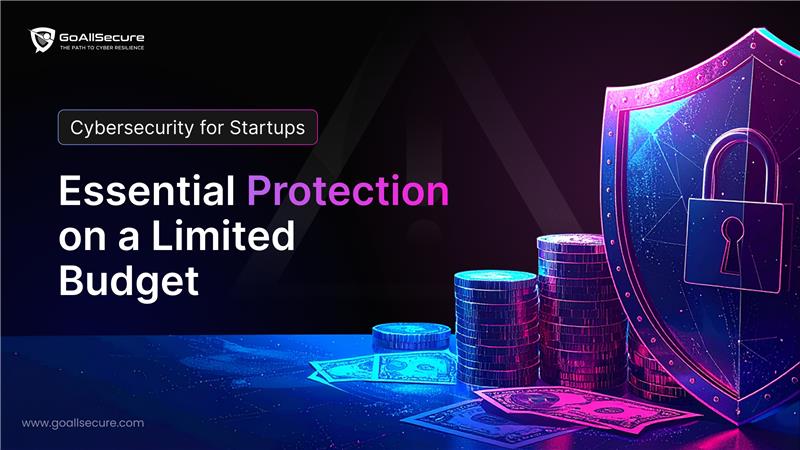Why can’t new businesses afford to neglect cybersecurity from the start?
Startups are the ones who come up with new ideas, adapt to changing situations, and make things happen in today’s digital-first economy. They work quickly, typically to acquire more users, develop products, and generate revenue. However, when companies aim to grow rapidly, they often overlook cybersecurity, which can be a costly mistake. Many people believe that cybercriminals only target big businesses, but that’s not true. Attackers see startups as easy targets because they have small teams, weak defences, and a lot of valuable data that continues expanding. New businesses can no longer stay “under the radar” since the world of cyber threats has become too intricate and dangerous.
Today, you don’t have to spend a lot of money to have solid cybersecurity, which is fantastic news. If businesses plan, utilise the proper technology, and prioritise security, companies with limited resources can still protect their digital assets without incurring significant expenses. This blog explains why new businesses need cybersecurity and how they can manage it on a tight budget.
The Truth About Startups and Vulnerabilities
Many things make startups incredibly vulnerable. Many new businesses utilise cloud-based and SaaS products without understanding how to set them up securely. Attackers quickly take advantage of vulnerabilities such as improperly configured cloud storage buckets, insecure APIs, and overly permissive access controls. Most startup teams are small and handle a wide range of tasks. This implies that one person may be in charge of development, IT, and operations, and they might not have had any professional security training. In this kind of setting, it’s easy for someone to get phished, neglect to update their software, or use weak passwords on all of their accounts.
Supply chain threats are especially harmful for new businesses, as they often rely on open-source parts and services from other companies to expedite development. If a vendor or dependency integration is compromised, the whole organisation could be at risk of being hacked. They also store sensitive client information, including email addresses, financial details, intellectual property, and health records. This makes them obvious targets for attacks on their reputation, data theft, and ransomware. Cyber risks are constantly changing, so businesses can’t wait until they have a product-market fit. From the outset, protection should be an integral part of the startup’s DNA.
Building a Security Base with Limited Resources
You need to know what you have, what threats you face, and what you need to do to keep hackers out of your computer. A startup can undertake basic things to significantly reduce its attack surface, even if it doesn’t have a security team. List down everything you own and decide who can access it first. You should be aware of the systems, platforms, and APIs being used, who has access to them, and whether they truly require those permissions. You will only need to keep track of your assets with a spreadsheet or a free program. The principle of least privilege suggests that people should only have access to what they truly need. This stops lateral movement in the event of a breach.
Next, ensure that secure authentication is at the top of your list of things to do. Ensure that all of your company’s critical accounts, including email, source code repositories, admin dashboards, and cloud consoles, utilise multi-factor authentication (MFA) and have strong, unique passwords for each service. You can use free or budget-friendly apps to keep everyone’s credentials safe. You can employ token-based access to prove your identity between services instead of sharing passwords. Another essential task that cannot be delayed is patch management. Ensure that all your plugins, frameworks, libraries, and operating systems are up to date. If you can’t set up automatic updates, be sure to schedule patch days periodically. Identifying security holes in outdated software is one of the most common methods of attack. It doesn’t cost anything but time and work to fix them.
Deploying Affordable Security Tools
Companies can utilise a multitude of free or affordable cybersecurity products in 2025 to help keep their data safe. Microsoft Defender (which is built into Windows), Avast, and Malwarebytes are all easy-to-use anti-malware tools that can protect your endpoints. You can utilise free vulnerability scanners or even free versions of paid platforms to monitor your attack surface. These tools can help you identify open ports, configuration errors, or flaws in your infrastructure that you are already aware of.
Adding static code analysis and dependency scanning to your CI/CD workflow is crucial for ensuring safe development. Before code or packages are made public, you can use several tools to identify hazardous code or outdated packages. Some of these tools offer several methods that can help keep your email safe against phishing attacks and domain spoofing. AWS, Google Cloud, and Azure all include free or low-cost security tools that can help keep the cloud secure. Some of these features are resource policies, audit logging, and identity and access management. Startups should utilise all of these built-in tools to their fullest extent and regularly check cloud permissions and access logs to identify any issues.
The Human Firewall: Training Employees
People still make mistakes that let hackers in, even if your technical safeguards are strong. Even if it isn’t mandated, startups should pay for training on how to stay safe online. Show your employees how to identify phishing emails, avoid suspicious downloads, and transfer files securely. You can use free apps that also offer a free trial to run phishing tests on your team and assess their readiness. Set explicit rules for your organisation regarding how to exchange passwords, utilise devices, and handle data.
When teams work from home or in a hybrid setting, it’s essential to protect endpoints. Tell staff to use VPNs, encrypted Wi-Fi connections, and approved organisation apps for work. There should be clear rules about using personal devices (BYOD) that specify encrypting them, checking apps, and locking displays. Inculcating a security-first culture is really important. When team members feel accountable for security and can discuss concerns or incidents without being blamed, the entire organisation becomes stronger.
Making a Simple but Clear Incident Response Plan
Startups should be prepared for the possibility that a breach could still occur, even if they take all necessary precautions. A simple plan for what to do in an emergency can mean the difference between a quick recovery and long-term damage. The plan doesn’t have to be hard to follow. It should specify who is responsible for handling an event, what actions to take (such as isolating systems, notifying stakeholders, or restoring backups), and how to document the incident. Ensure your team is aware of where to find this plan and how to implement it efficiently.
Making backups is another vital way to protect yourself. Back up your settings, codebases, and data frequently, and if possible, to a different location or cloud provider. Every now and again, check these backups to make sure you can get them back. Recoverability is typically the best method to protect yourself from ransomware attacks, especially if you can’t pay the hackers.
Seeking Professional Assistance
You can do a lot of things on your own, but there may come a time when your startup needs help from a professional. Suppose you work with healthcare data, payment card information, or corporate clients that require very tight security. In that case, consider hiring a cybersecurity company. These professionals can help you secure your architecture, review your code, or prepare for audits and certifications, such as GDPR compliance, SOC 2, or ISO 27001. Even if you don’t have a lot of money, short-term consultations or audits can help you find areas where you’re not doing well and improve your overall posture. GoAllSecure can be your trusted cybersecurity partner, helping you secure your business against cyber threats. We will handle all your cybersecurity-related issues and also take away those frown lines. For more information about us, kindly call us at +91 85 2723 7851.
FAQs
Why should a new business spend money on cybersecurity right away?
Startups must be particularly vigilant about cybersecurity, as they often handle sensitive information, including customer data, financial records, and intellectual property. Even with limited resources, a single breach can erode trust, damage a company’s reputation, and incur substantial time and financial costs. Investing in security early on prevents much larger losses later.
How can a new business stay safe on a limited budget?
Using strong passwords, enabling multi-factor authentication, updating software regularly, and monitoring system access are all ways that startups can enhance their system security without incurring significant expenses. Utilising free or inexpensive security tools and educating employees on how to recognise phishing scams can significantly improve security.
What are the most dangerous cybersecurity threats to new businesses?
New businesses are at risk of issues such as poorly configured cloud storage, weak access controls, phishing scams, supply chain problems caused by third-party tools, and outdated software. These problems make it easier for hackers to steal information or stop operations.
How important is it for workers to learn about cybersecurity?
Technology can’t save a new business if the workers don’t know what they’re doing. It’s imperative to teach workers how to recognise phishing attempts, stay away from downloads that look suspicious, and use safe online methods.
What should be in an incident response plan for a new business?
An incident response plan should outline who is in charge in the event of a security breach, what immediate actions need to be taken (such as shutting down systems or notifying stakeholders), and how to recover from backups. The team should be able to act quickly when things get tough, so it should be simple, easy to find, and tested often.
When is it time for a new business to hire a cybersecurity expert?
When a startup must comply with regulations such as GDPR, SOC 2, or ISO standards, or when it handles sensitive information like payment details or medical records, it requires professional assistance. Instead of hiring full-time employees, startups can hire virtual CISOs or part-time consultants to obtain professional advice at a significantly lower cost.


















 TRAVEL & HOSPITALITY
TRAVEL & HOSPITALITY HEALTHCARE
HEALTHCARE RETAILS & ECOMMERCE
RETAILS & ECOMMERCE BANKING & FINANCIAL
BANKING & FINANCIAL AutoMobile
AutoMobile MANUFACTURING
MANUFACTURING FOOD
FOOD EDUCATION
EDUCATION







